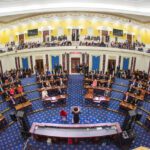The UK’s general election has resulted in a dramatic shift in political power, with Labour returning to power after 14 years and the Conservatives suffering their worst defeat ever, losing 250 seats. Sir Keir Starmer, the new Prime Minister, has secured a massive majority with 412 of the 650 seats.

Source: UK Parliament
This political change brings uncertainty to the crypto industry. The previous administration under Rishi Sunak had aimed to make the UK a “global crypto hub,” a vision that may now be sidelined with Starmer’s administration facing more pressing issues.
The All-Party Parliamentary Group on crypto has lost key members, including its chairwoman, Lisa Cameron, and seven other Conservative MPs. This has effectively silenced crypto advocacy within the House of Commons.
David Gerard, a critic of cryptocurrencies, noted the lack of interest in crypto from both major parties during the election. Labour’s focus appears to be elsewhere, with the cost-of-living crisis and high interest rates being more immediate concerns.
Despite the changes, there is cautious optimism within the crypto sector. Labour MPs and policymakers are being approached to establish new relationships and advance the digital assets industry. However, specific plans for the sector under Labour remain unclear.
CryptoUK, a trade association, emphasized the potential of the digital assets space to contribute to jobs growth and inclusivity, urging Labour to prioritize clear and proactive policymaking.
While the future of crypto regulation in the UK remains uncertain, Labour’s new administration could either present challenges or opportunities for the industry, depending on their approach in the coming months.










